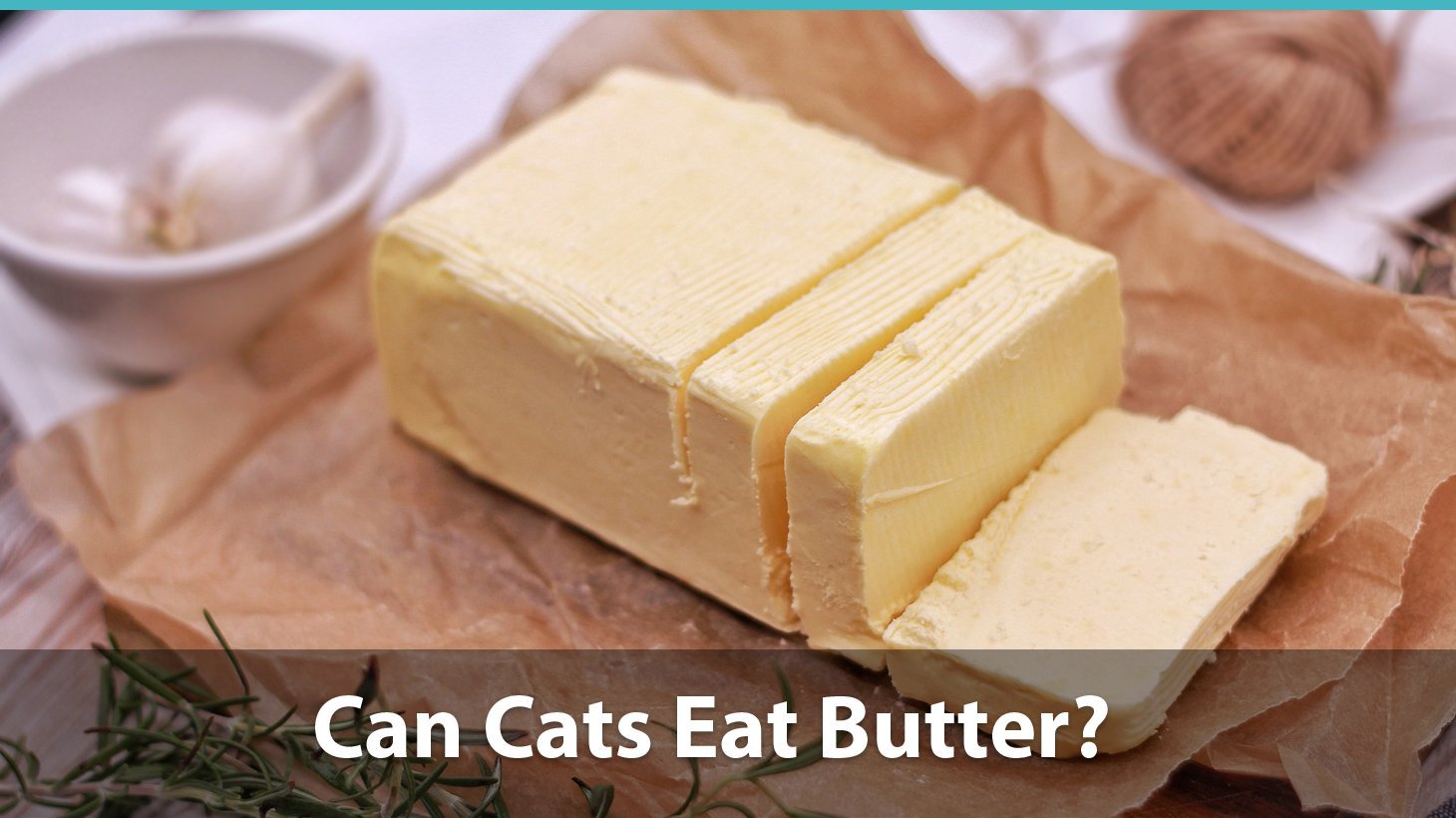Butter isn’t a typical cat food, but what if you want to share a nibble of your buttered toast with kitty? Or what if she’s got up on the counter and has licked some out of the butter tray?
Can cats eat butter? Or is she going to be sick?
Whether you give it intentionally once in awhile or if it’s consumed by accident, you should know the facts on feline dietary safety, particularly when it’s concerning dairy products.
Butter is high in fats and offers some vitamins, but does that really mean it’s OK?
So, Can Cats Eat Butter? Is It Healthy Or Harmful?
The bottom line is that cats should not eat butter.
While it offers vitamins A, D, B-12, calcium, and protein, it’s also full of a whole lot of saturated fat. In fact, it’s about 80% fat, with about 65+% of it being saturated.
That’s not the same as the healthy unsaturated fats cat need in order to grow and thrive.
In terms of fat, all that butter will bring to the table for your kitty is obesity, and secondary health complications derived from too much fat consumption.
What’s more, even though it has vitamins, they don’t come in sufficient quantities for your cat or kitten. Your furball will benefit significantly more from vitamins found in meat, and those that are added to quality cat foods. So in terms of fats and vitamin intake, butter is not healthy for cats.
But butter isn’t just high in fat and not the best way for your kitty to get her vitamins.
It’s a dairy product, which means we need to talk about lactose.
Most Cats Are Lactose Intolerant…But Does It Matter?
As you know, butter is usually made from cream or milk.
And most milk products contain lactose, a sugar in milk.
Lactose is typically broken down by the enzyme lactase. But lactase production in most animals, including cats, slows significantly or stops altogether when they wean.
In other words, your adult cat has nothing in her body to break down the milk sugar lactose, which can cause digestive distress and discomfort.
So yes, cats are lactose intolerant, for the most part.
However, butter actually contains very little lactose. Trace amounts, even.
That’s because it’s mostly fat.
For most cats, that means that lactose-wise, it’s actually fine, unless she’s allergic to milk/lactose.
If allergic, even a little bit can cause severe problems.
So, while most milk products are a straight no-no when it comes to feeding a feline, butter isn’t one of them.
That doesn’t change the fact that you shouldn’t feed butter to your cat, since it’s not a normal, natural, or healthy part of her diet.
Can You Give Vegan Butter To A Cat?
Still a nope.
In order to substitute for animal dairy, vegan butter manufacturers opt for deriving butter from plant-based oils. Does this mean vegan butter is good for cats? Not exactly.
Plant oils are still high in fats and not always the good types of fats. They aren’t as high in cholesterol as animal fats, but they aren’t healthy for cats.
Butter and margarine made with non-dairy products don’t offer enough nutrients to sustain a feline furball. They can’t offer a boost to your pet’s everyday diet, so what’s the point?
At best they do nothing, at worst they give her an upset stomach, or take away valuable nutrients that would have come from the food she would otherwise eat.
Bottom line is vegan butter products have no place in a cat’s diet at all, regardless of their primary ingredients.
Kitties are carnivorous creatures. They literally cannot thrive on a meat-free diet. A feline’s body cannot synthesize enough of the crucial nutrients, such as taurine, on its own, which is why cats must obtain their sources of sustenance from real meat. There’s no way around it and a vegan or vegetarian diet will only harm their health, thus shortening their lifespan.
But What About The Benefits Some People Mention?
Yes, some pet parents believe butter can offer advantages to their feline furballs.
Some kitty owners cook homemade meals for their cats with butter instead of with oil. Others believe butter can be a fat boost to an underweight cat and help with weight management.
Unfortunately, such usages of butter will bring more harm than benefits.
Quality cat foods use an animal fat like chicken fat, or a cut of meat that will offer some fat.
And then there are those pet parents who use butter as a hairball control remedy.
Truthfully, it can “grease” down the hairballs and help your kitty get them out of its digestive tract. Nevertheless, butter is not manufactured for feline consumption and shouldn’t be treated as such.
Even if your kitty doesn’t have any problems with lactose, you shouldn’t press your luck.
In this day and age there’s an abundance of hairball control products available on the market. They are vet approved and manufactured specifically for felines. Meaning, they are not only safer, but also much more efficient for coping with the hairball problem. Ask your vet which one is most suitable for your own cat’s case instead of choosing butter as a homemade remedy.
So, let’s sum it up.
Butter – traditional or vegan – is not healthy for cats. It can cause health issues and can lead to a potentially fatal obesity. It doesn’t offer any nutritional value for your cat.
And if your pet keeps pleading for that buttery treat it wants so badly, don’t be tempted to give in. Spoiling the cat’s appetite and behavior with an unhealthy treat like butter is even worse than spoiling it with something more nutritional, like fish or other types of real meat.


